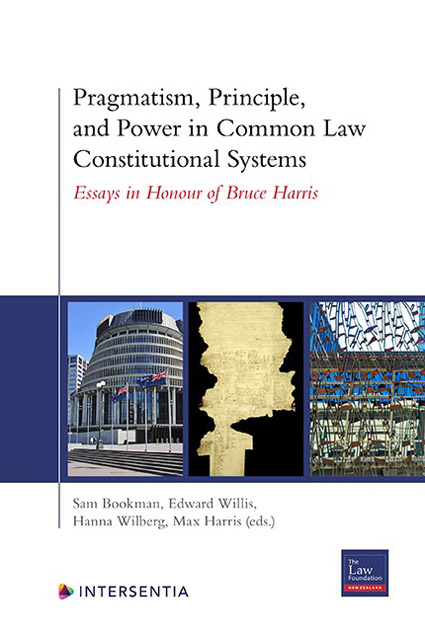 Pragmatism, Principle, and Power in Common Law Constitutional Systems
Pragmatism, Principle, and Power in Common Law Constitutional Systems Book contents
- Frontmatter
- Foreword
- Preface
- Contents
- The Writings of Professor Bruce Harris
- List of Cases
- List of Contributors
- Introduction
- Part I The Nature of Executive Power
- Part II Issues Concerning The Judiciary: The Nature of Judicial (and Executive) Power
- Part III Issues Concerning The Judiciary: Creativity and Pragmatism in Judicial Method
- Part IV Issues Concerning The Judiciary: Judicial Appointment and Accountability
- Part III The Nature of Unwritten Constitutions and Their Future
- Index
Written and Unwritten Constitutions: The Modality of Change
Published online by Cambridge University Press: 19 November 2022
- Frontmatter
- Foreword
- Preface
- Contents
- The Writings of Professor Bruce Harris
- List of Cases
- List of Contributors
- Introduction
- Part I The Nature of Executive Power
- Part II Issues Concerning The Judiciary: The Nature of Judicial (and Executive) Power
- Part III Issues Concerning The Judiciary: Creativity and Pragmatism in Judicial Method
- Part IV Issues Concerning The Judiciary: Judicial Appointment and Accountability
- Part III The Nature of Unwritten Constitutions and Their Future
- Index
Summary
INTRODUCTION
Written constitutions are the norm, unwritten constitutions the rare exception. There is much that can be said as to the commonalities and differences between them. There are, nonetheless, two principal variables that underscore the respective forms of constitution, which in turn impact on the modality of change : the extent to which the constitution is committed to writing, and the extent which the constitution is perceived to be separate from, and superior to, ordinary law.
These twin variables are commonly perceived to be linked. There is empirical warrant for this assumption. The paradigmatic written constitution, which contains the principal constitutional norms in a single document, will commonly also enshrine, expressly or impliedly, constitutional review through which courts subject ordinary statute to review for constitutional compliance; the constitutional norms of the paradigmatic unwritten constitution will normally be found in a plethora of sources, and ordinary statute will customarily have pride of place in the constitutional schema.
There is, however, no a priori normative reason why these twin variables should be linked in this manner. The embodiment of constitutional norms in a canonical document does not predetermine the content of the constitution, nor does it impel the conclusion that constitutional review exercised by a court must be part of the resulting schema. This is exemplified, as will be seen below, by the UK, where some suggestions for the shiftto a written constitution are premised on the assumption that parliamentary sovereignty remains a cornerstone of the constitutional ordering. It is, by parity of reason, equally possible in principle to think of an unwritten constitution, the central features of which are markedly similar to those of the paradigmatic written constitution, such that it is accepted by all relevant players that ordinary legislative power is bounded by certain structural and rights-based precepts that are enforced, inter alia, by the courts. The manner through which this might occur will be considered more fully below.
It follows from the foregoing that while the extent to which constitutional norms are committed to writing is of significance in distinguishing the two forms of constitution, the second variable is more important in normative terms, and shapes the way in which change is effectuated. The contrast in this respect is sharp. The foundational starting point of the standard written constitution is the distinction between law-making through ordinary politics and the constitution; the latter circumscribes the former, such that the terrain of ordinary politics is bounded by the constitution.
- Type
- Chapter
- Information
- Pragmatism, Principle, and Power in Common Law Constitutional SystemsEssays in Honour of Bruce Harris, pp. 263 - 288Publisher: IntersentiaPrint publication year: 2022


